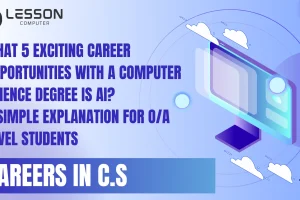
Achieve A+ in A-Level Computer Science: Proven Tips
To get an A+ grade in computer science, you need to study hard, and this requires effort. You also need a well-planned study schedule and a deep understanding of both theoretical concepts and useful skills. You need a solid grip on data structures. You need to understand algorithm design, arrays and lists, functions, procedures skills, and other related ideas. This will help you avoid making mistakes on exam day.
In the article, you’ll learn how to get an A+ grade in A-level Computer Science. In this article, we’ll discuss the major areas. First is the careful approach to tackling your issue. We’ll also cover ways to raise your abilities and study knowledge to earn excellent marks.
Some Tips to Achieve A+ Grade in A-level Computer Science:
The A-level Computer Science exam format can be challenging. Nonetheless, it is possible with the proper strategy and preparation. The possibilities are countless when you work hard! You can get an A+ on your exam through exam techniques of preparation. These include brain maps and techniques for improving memory.

Tips are Included:
- Exam Study Techniques
- Preparation for Exams
- Revision Manuals
- .Revision Approaches
- Management of Time
- Coding Abilities
1. Exam Study Techniques:

- You can get an A+ in A-level Computer Science with successful exam techniques for study. Exam preparation requires note-taking, effective writing skills as well as time management and techniques to save time.
- Programming knowledge is needed to pass the Computer Science exam. You can achieve confidence and learn the exam language by using Python, Java, and VB.NET
- Another important point to exam preparation for A-level Computer Science is strategies for revision.
2. Preparation for Exams:

Preparation for exams is needed to achieve success in A-level computer science. To achieve good marks on the test, study smart.
You need a strong grip on data structures, algorithm design, arrays, and lists. You also need skills in functions and procedures and other related ideas. This will help you stay away from making mistakes on exam day. You can get this by working with teachers or using online techniques like earlier exam papers. This will give you an advantage in problem-solving and allow you to confidently answer any paper question.
3. Revision Manuals:

Each year, more than 5 million students part in the Cambridge International A-level exams. That’s a lot of would-be computer scientists! Revisions are helpful for A-level Computer Science. From well-known programming languages to algorithms and programming, they offer added information on all facets of Computer Science. Additionally, they give data on exam preparation and software development.
Also useful for studies in Computer Science guides in materials. Online, you can find free guide data that covers a range of subjects. These range from GCSE Computer Science to university-level Computer Science degree programs.
4. Revision Approaches:

- To achieve the best marks in Computer Science at the A level, revision is required. It is important to understand the internet, communication, software engineering, hardware, and computer systems. Knowledge of true programming is also needed.
- Time for an allusion. Receiving an A+ in Computer Science can be challenging. It is not impossible, like building a spaceship out of toothpicks. Practice and revise with confidence.
- Techniques for revision range depending on the topic. online resources, Textbooks, video tutors, and practice papers should all be used during revision for any topic. It is also crucial to have a solid grip on the most popular programming languages. Many students gain from speaking with an expert in the field. The best way to learn new skills is to practice it.
5. Management of Time:

Success in A Level Computer Science requires time management. You can master it like a major power and reach all of your educational goals. It takes determination and persistence to keep doing all the work needed to achieve your desired grade
There are many options for time management with our online A Levels education. We have everything you need to succeed in your studies. We offer courses that will help you develop a full understanding of the topic. We also supply A-level courses that will improve your score and expand your career expectations.
6. Coding Abilities:

- Programming is a must to pass the A level of Computer Science. 90 % of A-level Computer Science Students, according to Cambridge University, have programming knowledge.
- Complex algorithms need to be coded and debugged. Binary and hexadecimal techniques must be used. Logic and data structures must be used to solve problems in advanced programs.
- To guarantee my students understand the basics before they move on to more difficult assignments.
Is Getting an A+ in A-Level Computer Science Considered Good?
Gaining A+ grades in A-Level Computer Science is an unusual achievement. This grade demonstrates your ability. It is highly regarded by university employers as it shows your efforts in commercial thinking. It also indicates your technical ability.
Furthermore, A+ grades in Computer Science offer many opportunities. These opportunities exist whether you intend to pursue higher studies in a related field. They are also available if you plan to enter the tech industry. It not only boosts your academic profile. It also creates a strong foundation for future studies. This foundation helps career prospects in software development technologies and other related fields.
How to Succeed in A-Level Computer Science
Work on daily projects, solve problems and challenge yourself with coding exercises. The more you code, the more confident and skilled you become. By doing so, you’ll strengthen your understanding of algorithms. You will also improve your problem-solving skills, which are key pillars of success in A-Level Computer Science.
FAQ,s:
Data structures and algorithms are important topics, as they form the base of many exam questions.
Yes, preparing past papers helps you understand the exam format and the types of questions you will face.
Both are important. A good balance between understanding theoretical concepts and practical programming skills is key.
Practice coding daily challenges and puzzles on platforms like LeetCode or HackerRank to increase your skills.
Practice timed exams to get comfortable with the pace, and allocate time to each question based on its marks.
Conclusion:
Getting an A in A-level computer Science requires a strong grip on consistent practice, key concepts, and successful study techniques. By focusing on algorithms, data structures, and coding skills, you can increase your understanding. Using revision master planning can boost your confidence. Ultimately, this will lead to success in your exams.



